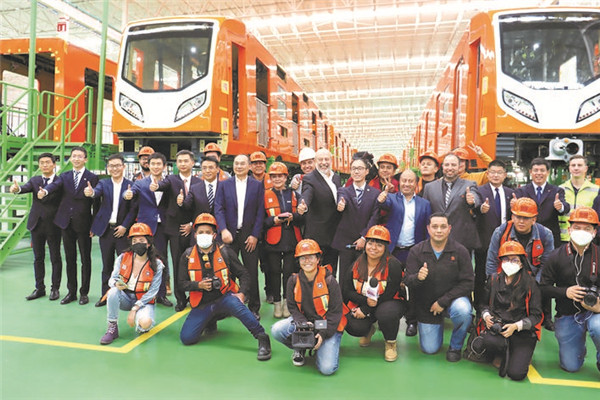The first locally-produced metro train for the Mexico City Metro Line 1 rolls off the production line in Querétaro State, Mexico. Photo provided by CRRC ZELC The first locally-produced metro train for the Mexico City Metro Line 1 recently rolled off the production line in Querétaro State, Mexico. It was a milestone of CRRC's first overseas "System Plus" project. The Mexico City Metro Line 1 is an urban rail artery connecting other metro lines and BRT system in the city. Its passenger throughput accounts for 15% of the total of the whole metro network. Operated for over five decades, the line is in sore need of facility modernization and upgrading. In 2020, the CRRC Zhuzhou Locomotive Co., Ltd. (CRRC ZELC) and the CRRC (Hong Kong) Co., Limited jointly won the bid of the Mexico City Metro Line 1 modernization project. As contracted, 27 new metro trains should be produced in Mexico. Beyond that, CRRC ZELC was asked to provide services including investment and financing, train manufacturing, and upgrading and maintenance of the communication and signal system, telecommunication lines, and electromechanical system for existing trains. The train was designed with bright colors and distinctive Mexican characteristics. It is 150.9 meters long and 2.52 meters wide, and composed of 9 carriages. It has a maximum speed of 80 kilometers per hour, and can accommodate 2,252 passengers. The train bogie can reduce noise during operation, and adapts to the terrain in Mexico. In addition to the rubber tyres on the bogie, steel tyres are equipped to safeguard train operation even in extreme conditions. CRRC ZELC founded the Mexico Rail Transit Equipment Co., Ltd. in 2021 to promote localized production, and constructed a new train factory in Querétaro State which began operation in August 2022. The Chinese and Mexican technicians worked together at the factory. More than 150 jobs were created for local job seekers, and over 70 local suppliers were found. The factory will hire more local people in the future, and be committed to promoting development and upgrading of the local rail transit equipment industry.
Mexican Metro train production localized with Zhuzhou solutions
Editor:谭婕倪
Source:enghunan.gov.cn
Updated:2022-11-30 09:13:02
Source:enghunan.gov.cn
Updated:2022-11-30 09:13:02
Special
Contact
Welcome to English Channel! Any suggestion, welcome.Tel:0731-82965627
lisl@rednet.cn
zhouqian@rednet.cn











